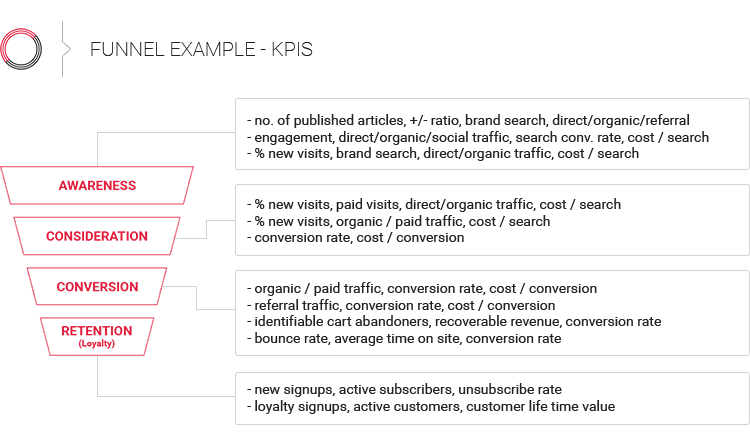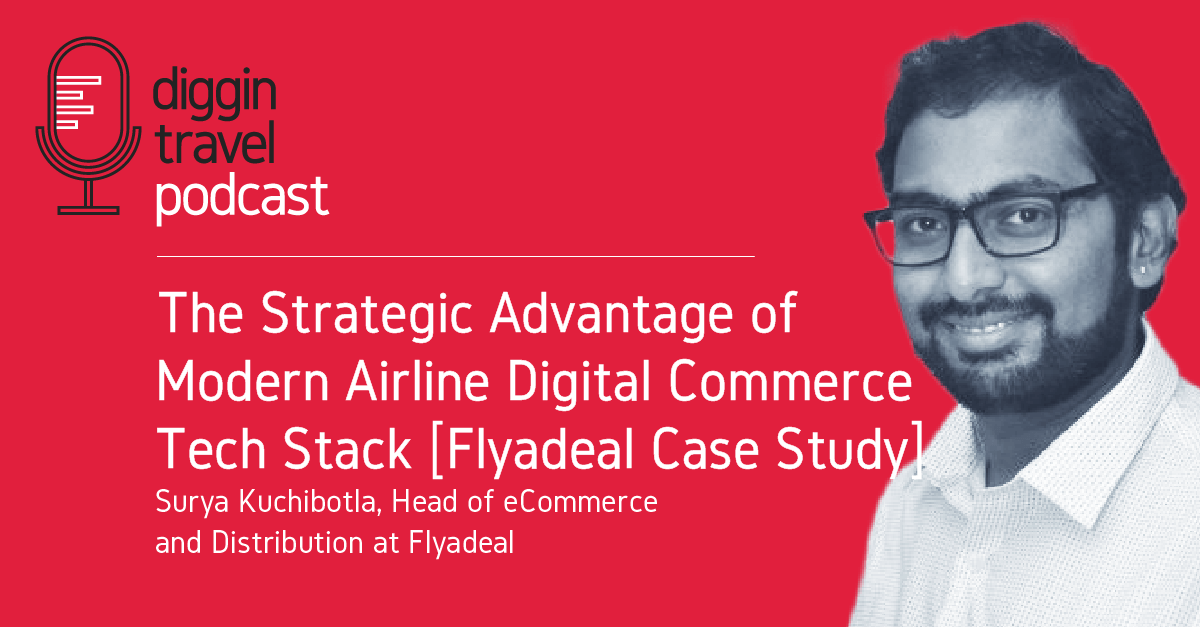Select Sidearea
Populate the sidearea with useful widgets. It’s simple to add images, categories, latest post, social media icon links, tag clouds, and more.


hello@youremail.com
+1234567890
+1234567890
Populate the sidearea with useful widgets. It’s simple to add images, categories, latest post, social media icon links, tag clouds, and more.


Iztok Franko

A modern airline digital commerce tech stack is seldom highlighted as a differentiator within the airline industry.
At Diggintravel, we often discuss how effective digital marketing for airlines is a blend of UX, data analytics, experimentation, and marketing technology. Recently, you can add AI to the mix.
But rarely do we see an airline declare their digital commerce tech stack as their differentiator. Well, flyadeal, an agile low-cost carrier (LCC) in Saudi Arabia, is doing just that.
Flyadeal is elevating their airline digital commerce tech stack to become a core competitive edge.
We are thrilled to have Surya Kuchibotla, Head of eCommerce and Distribution at Flyadeal and a seasoned leader in airline ecommerce, join us to dissect their digital strategy in detail.
This discussion includes some of the most vital topics for airlines today, such as personalization, Customer Data Platforms (CDP), and AI-driven conversational commerce.
Listen to the new episode of the Diggintravel Podcast to learn all you need to know about airline digital commerce tech stack, personalization, and conversational commerce, or read on for key highlights from our talk with Surya:
And don’t forget to subscribe to the Diggintravel Podcast in your preferred podcast app to stay on top of the latest airline digital analytics, marketing, data science and AI trends!
When I spoke with Surya, one thing that quickly became apparent was his belief in the strategic advantage of flyadeal’s consolidated, centralized approach to digital marketing. He views this integration as essential for agility and efficiency within their operations:
If you see the majority of the LCCs, it is a decentralized mechanism where product management sits on one side, CRO sits on one side, and performance marketing sits on a different side. So there is no centralized stack where they will realize value. At flyadeal, we started as a digital direct airline, so that means we never had any third-party distribution. Our website and mobile app have to be robust enough to cater to that B2C direct demand. So we started evaluating, saying, what would be the best structure? We don’t want to get into a decentralized, dysfunctional approach. So we thought, okay, we will centralize everything.
CRO, product management, and performance marketing is extremely centralized within ecommerce itself. One advantage it brings us is we have shared goals, shared objectives. That means it’s increasing conversions, improving user experience, and driving revenue growth, which is extremely centralized in terms of goals as well as the technology.
A key advantage of flyadeal’s centralized approach is the ability to conduct consolidated, end-to-end campaigns that span from initial digital advertising, through the booking flow, to post-booking interactions, ensuring a cohesive user experience. Here’s how Surya describes the operational benefits:
Consider it from top of the funnel. You have great messaging, which is we are the LCC out of Saudi Arabia. You have great messaging that we are fly for less, everyday low fares. But if you don’t have the opportunity of getting this to the right audience, which is somebody who has come to your website but hasn’t converted, they have been silent for 90 days, 150 days, 180 days – this is the right audience where you will nudge continuously. And when they come to your direct channels, you understand their preferences and behaviors on the product itself to improve the user experience and maximize the conversions.
Any frictions on the touchpoints and the analysis of behavior, data, and A/B experimentations are input for your product management, which is just right across to you. So you don’t have the bigger organizations or legacy way of running ecommerce where all these three are into different departments, where you are not influencing the decision-making for ideal revenue growth and monetization of your direct channels. Because of centralization, you just have influence, “Based on experimentations, this is a friction point. Okay, product management team, let’s fix it.”
In a modern airline digital commerce tech stack, data has to act as a fundamental pillar, connecting and enhancing all areas. Flyadeal has integrated a Customer Data Platform (CDP) and digital analytics as foundational elements of their centralized tech stack. Having a unified view of the customer, which is the ultimate goal of utilizing CDP, adds significant value to this integrated technology approach, enhancing every interaction along the customer journey.
Data plays a very crucial role in all the three pillars. You consider these three as a tripod. If you minimize utilization of either of it from data-driven decision-making, then it will topple. Everything relies on data analysis and insights for the decision-making process, whether it is you want to optimize your spends – great. You need data for it. And you want to optimize the product features – you need data for which experimentation signifies incremental value, which experiment signifies increased probability to win or generate incremental revenue. In fact, all these three things and your CDP data will refine and define your marketing strategy.
Here’s an example of how data feeds all three pillars—CRO, performance marketing, and product management—for flyadeal:
I can give you a couple of examples here. From a CRO perspective, flyadeal is at a mature stage in terms of experimentation. If you see our website, there are continuously experiments running on the website. To put a number to it, in 2023, we have run over 500 experiments on the website. This is the scale at which we are running CRO. We have been in CRO for almost five years now compared to other airlines who are trying to adopt recently. That’s the strength.
So where we take this data and then use it on the ad channels is not just taking the raw data of audiences and doing it. We do have some predictive algorithms and engines running behind where we will take a certain audience and say, “What is the likelihood of this audience purchasing a ticket in the next 30 days?” We bring in AI along with the set of audiences and predict it based on multiple parameters. It can be likelihood to purchase, what is my conversion prediction of a set of audiences who have purchased with me but who haven’t purchased for the last 90 days. Out of the existing pool, I will take a custom conversion prediction based on non-converters. We will send these audiences to our ad channels. It can be Google SEM or Microsoft SEM, Microsoft Bing, or Facebook. This is where we will reduce our customer acquisition cost and increase ROAS. This engine we have set up is extremely robust. To put a number or a use case, in 2023, over 60% of our prospecting ads on Google SEM were backed by our primary data.

One aspect Surya highlighted in our discussion is flyadeal’s use of their data and tech stack to deliver highly personalized and relevant messaging. Given the long pursuit of personalization within the airline industry, I was curious to learn about flyadeal’s approach under Surya’s leadership.
Personalization has been there for a while and has been used and overused. There are three levels of personalization. One is majority of the people think that UI manipulation is also personalization. UI manipulation is just you’re not taking the effort of the IT team or the development team who manage UIs. This is not personalization. It doesn’t bring you any incremental value.
The second level of personalization is your user behavior driven personalization. That means Surya goes to flyadeal.com; I always proceed to the next page if I am only shown the available flights out of 20 flights rather than showing the entire schedule. Or my continue button is always purple versus lime. I am actually catering the UI based on the user behavior. This is the second level of personalization.
Third level of personalization is hyper personalization. That means every time I come to the booking flow, it is extremely curated towards what my behavior is. That means every time Iztok comes to flyadeal.com, he purchases a Jeddah-Riyadh flight and he always sits on 1 Alpha. As soon as you come to the seats page, 1 Alpha is already selected and you go straight to the payment page. This is hyper personalization at product level. So you have more product mix beyond flights; this is where the game is. The airline works on a thin margin, so your money is beyond flights.
Surya emphasized the transformational role of their modern airline digital commerce tech stack, particularly through the innovative use of conversational commerce. This strategy not only adapts to user preferences for communication channels but also significantly enhances personalization by adding the right channel—the next step in achieving ultimate relevancy. Here’s how he explains the integration and impact of these technologies:
We are a B2C heavy driven customer airline, so we have an urgent need to communicate to our customers. Based on my previous experiences, all the communication channels are sporadic. But if you are building an extremely robust CRO function where you are centralizing all the data and you are actually using it for meaningful and monetization purposes, then there is an acute need of integration of insights with communications, or else you are actually sending messages sporadically without knowing what is the effect of it.
We have insights and we have centralized all the communications into one platform. That means we have a single customer view in terms of their email contact, phone contact, their reactivity, their reachability on a web push, their behavior on an app push, how they behave on a WhatsApp message. So I don’t need to send one message across all channels. I will only send a message where the user is reactive, or I will build a messaging flow based on the user behavior.
That means, okay, Iztok is a user on flyadeal who’s always opening the email but he always converts on a WhatsApp message. So I don’t need to send him an app push because it becomes a barrier for conversion. So by centralizing the notifications, you are actually making it more cost efficient by reaching to the customer, and you are cutting down the communication barriers for faster conversions.
Flyadeal is shifting from traditional transactional commerce to developing true conversational commerce capabilities, particularly on platforms like WhatsApp, where they aim to craft genuine conversational flows rather than merely replicating existing email or upsell tactics.
We are moving to conversational commerce. Until now we were talking only about transactional commerce. I will give a use case of WhatsApp. We have WhatsApp marketing, which is just using for transactional as well as upsell communications. Saudi Arabia is a unique country where the average age of young audiences is just 20 years, 25 years, which fits in with the brand of flyadeal. And each user has at least two devices, and they conversate a lot on WhatsApp.
So how do I make my brand and booking channels relevant on WhatsApp for these audiences? We brought in an idea, saying, can we build a booking engine on WhatsApp that’s a bigger thing for us? Then we found a sweet spot, saying, okay, other airlines are still trying to do a hyperlinked check-in flow. We found a use case from a full-service airline where you can do WhatsApp communications, but it will redirect you to an external page, which is a website or a mobile app, to do transactions. So we found a use case, saying, can we build a booking engine? Start with the check-in flow.
That means you will do the check-in flow on WhatsApp, you get your boarding pass, you go straight to the gate using WhatsApp. It will be that easy. That means everything will be on mobile, so there is nothing beyond mobile. We are on the last leg of this exciting conversational commerce thing, which is relevant for our audience. The users get stuck to a brand just because of relevancy of the booking channels.

Listen to the full podcast chat with Surya to gain detailed insights into how flyadeal:
To learn more about any of these topics, make sure to listen to the entire podcast. You can access it through the embedded podcast player in the article or on your favorite podcast platform.
If you want to learn from leaders like Surya about airline digital commerce tech stack, conversational commerce, and AI, or just want to be the first to know when our next Airline Leaders Interview will be published, please:
I am passionate about digital marketing and ecommerce, with more than 10 years of experience as a CMO and CIO in travel and multinational companies. I work as a strategic digital marketing and ecommerce consultant for global online travel brands. Constant learning is my main motivation, and this is why I launched Diggintravel.com, a content platform for travel digital marketers to obtain and share knowledge. If you want to learn or work with me check our Academy (learning with me) and Services (working with me) pages in the main menu of our website.
Download PDF with insights from 55 airline surveyed airlines.
Thanks! You will receive email with the PDF link shortly. If you are a Gmail user please check Promotions tab if email is not delivered to your Primary.
Seems like something went wrong. Please, try again or contact us.


No Comments